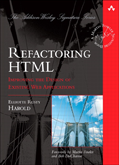Two Criteria for Closures
Thursday, February 15th, 2007I’m slowly coming around to the idea that first class functions in Java are probably a good idea. I’m still not convinced we need full-blown closures though. Possibly we do. Doug Lea has some interesting use cases I need to explore further.
Several things concern me though. One is syntax. I really, really want the syntax to be simple and have no surprises or significant learning curve. I want existing Java programmers to be able to read Java code that uses closures (or first class functions) and immediately be able to see what the code is doing without any prior training in the new syntax. I want the syntax to be that clear. If we can’t have that, I don’t want to do it. I want Java to still be a lingua franca.
Secondly I want closures to be really, really easy to write. No gotchas. A little training may be allowed here, but there shouldn’t be any special cases or surprises. Programmers’ first instincts of how to write something should be correct. In particular, I do not want to see any issues like “the closure works if the external variables are declared final, but fails if they’re not.” Or, “the closure works if the external variables are not modified, but stops compiling if a line is added that modifies one.” That is, implicit final is not a workaround. The only things that break the closure should be:
- Syntax error inside the closure itself
- Breakage in the closure syntax (i.e. leaving off a trailing curly brace or some such in the closure definition)
- Removing or renaming an external variable the closure depends on.
In other words, the only things that should cause a closure to fail to compile or run in the expected fashion should be exactly those things that cause today’s code to fail to compile or run. If you rename a local variable from x to y and forget to rewrite the statement foo(x);, then the compiler complains. This is a common bug we all know how to handle when it happens to us. I want to make sure that adding closures does not add any new failure types or patterns.
Those are my requirements for any proposal to introduce closures or first class functions into the Java language. I am prepared to reject any proposal that does not meet these two criteria. If no proposal can satisfy these two criteria, then we shouldn’t add closures or first class functions.
So what are the proposals on the table, and how well do they meet these criteria?
(more…)
